The Minnesota Frost are back-to-back PWHL champions, taking down the Ottawa Charge 2-1 in Game 4 of the league's best-of-five Finals to lift the Walter Cup for the second time on Monday.
All bouts in the 2025 PWHL Finals were overtime affairs that finished in 2-1 results, with No. 3-seed Ottawa claiming Game 1 before the No. 4-seed Frost swept the next three games to claim the 2024/25 league title.
Monday's deciding matchup saw forward Kelly Pannek give Minnesota their first lead of the entire series by striking first in the second period before Ottawa forward Tereza Vanišová equalized in the third to force overtime.
Following 12 extra minutes of play, Frost forward Liz Schepers netted the game-winner — doing so for the second year in a row — to secure the Walter Cup in front of a Minnesota home crowd of 11,024 fans.
"I'll win anywhere. It's always fun — but to get to do it at home is extra special," said Frost defenseman Lee Stecklein following the Memorial Day victory.
Frost's Stecklein, Charge's Philips top PWHL Playoffs stat sheet
Stecklein finished the postseason as the league's scoring leader, notching four goals and four assists to finish atop the Frost-laden skaters' table with eight points — narrowly surpassing the seven points posted by teammates Sophie Jaques (two goals, five assists) and Taylor Heise (one goal, six assists).
On the other hand, Ottawa goaltender Gwyneth Philips led all net-minders on the PWHL's postseason stat sheet while playing the most minutes between the pipes in league history.
The rookie's failure to drop a single game in regulation throughout the Charge's eight playoff matchups helped earn her the Ilana Kloss Playoff MVP Award, despite Monday's series loss.
Notably, Minnesota's second straight PWHL championship belies the Frost's underdog status.
After needing another team's downfall to even squeak into the playoffs, doing to on the last day of the regular season, Minnesota got hot at just the right time to retain their singular hold on the second-year league's title.
"It's the belief we have in the room," Frost captain Kendall Coyne Schofield said after the win. "It's hard to put into words. I think when you look at the way we won, it takes everybody."
For the second straight year, the 2025 PWHL Finals are down to the postseason's underdogs, with the No. 3 seed Ottawa Charge and the No. 4 seed Minnesota Frost facing off in the best-of-five championship series after ousting the league's top teams.
Minnesota booked their Finals spot with a 3-1 series victory over No. 2 seed Toronto last Wednesday, before Ottawa ousted top-seeded Montréal by the same series margin on Friday.
While the Frost gear up to defend their 2024 Walter Cup title this week, first-time playoff team Ottawa will aim to make even more history by securing Canada’s first-ever PWHL trophy.
This year's PWHL Finals pits Minnesota's red-hot offense, which netted 18 goals across four semifinal games, against Ottawa's shutdown defense.
Led by rookie goaltender Gwyneth Philips — a 2025 Goaltender of the Year finalist — the Charge allowed just six pucks into the net through four playoff games.
Philips's top save percentage and low 1.14 goals-against average will be put to the test by the Frost, who claim seven of the PWHL's Top-8 postseason players, led by forward Taylor Heise and her seven playoff points.
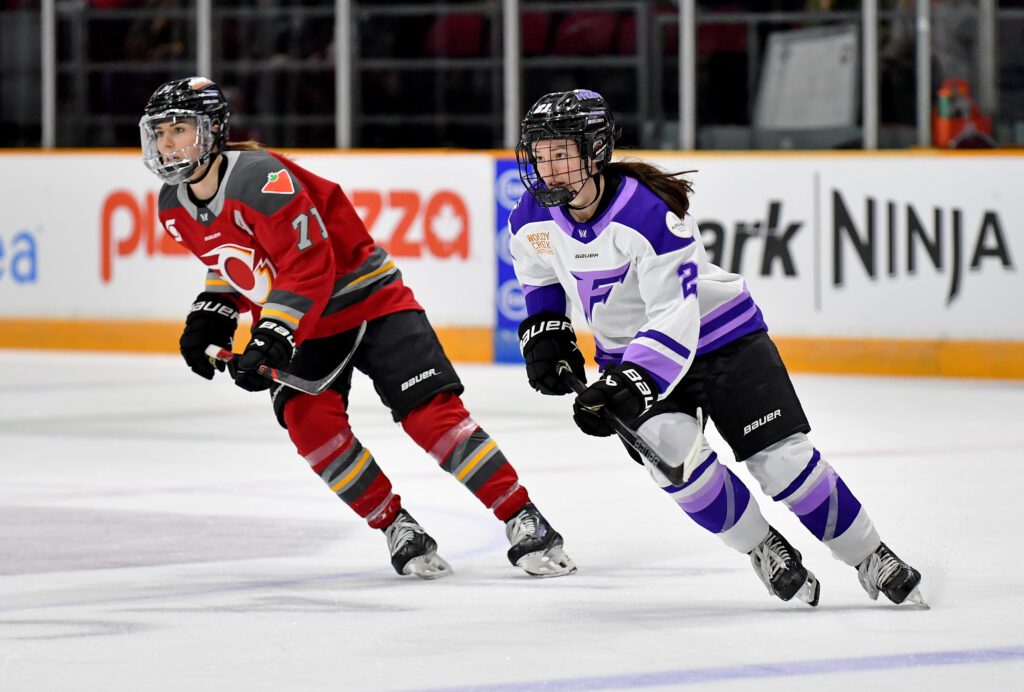
How to watch the 2025 PWHL Finals
The puck drops on the 2025 PWHL Finals tonight at 7 PM ET, as Minnesota hits the ice against Ottawa live on YouTube.
Top-seeded Montréal suffered a surprising loss in their first 2025 PWHL Playoffs game on Thursday, falling 3-2 to postseason debutant No. 3-seed Ottawa.
Despite a tense back-and-forth battle, Ottawa forward Shiann Darkangelo broke through with a third-period game-winning goal, pushing the Charge to an early lead in the best-of-five semifinal series.
The Victoire, who notably used their No. 1-seed advantage to handpick the Charge as their semis opponent, have yet to log a playoff win, adding Thursday's defeat to last season's first-round sweep by Boston.
Even so, Montréal is already viewing the loss as fuel to even the score this weekend.
"We outshot them, we had a lot of great opportunities. We were right there," said Victoire forward Laura Stacey. "If we can put that game together for a whole 60 minutes, it'll look scary I think."
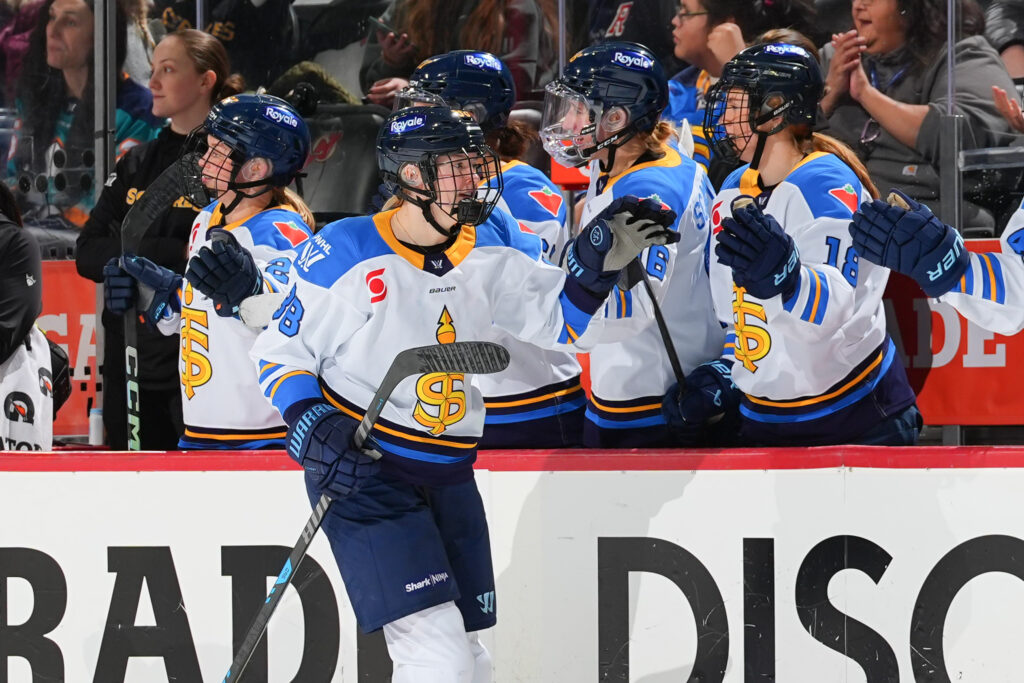
Toronto takes Game 1 from defending champs Minnesota
In the PWHL's other semifinal matchup, No. 2-seed Toronto claimed a one-win advantage over No. 4-seed Minnesota on Wednesday, halting the defending champion Frost's late-season surge with a 3-2 Sceptres victory.
Captain Blayre Turnbull opened scoring in the first period, giving Toronto a lead that they never relinquished, while rookie Julia Gosling netted a second-period brace to secure the Sceptres' win.
Minnesota, acknowledging the tough road they face to return to the championship ice, has already set their eyes on Game 2.
"It's going to be a hard-fought series," said Frost head coach Ken Klee after the Frost's Game 1 loss. "We didn't get one tonight…[so now] we're looking forward to Friday."
How to watch the 2025 PWHL Playoffs this weekend
Toronto and Minnesota are back in action for Game 2 of their series at 7 PM ET on Friday, before traveling to St. Paul for Game 3 at 6 PM ET on Sunday.
Sunday will also see Montréal’s attempt to even their series with Ottawa, with the puck dropping on their Game 2 matchup at 2 PM ET.
All games will stream live on the PWHL YouTube channel.
The 2025 PWHL playoffs are officially set, with the Ottawa Charge and Minnesota Frost punching their postseason tickets in Saturday's final regular-season games to join the first-place Montréal Victoire and second-place Toronto Sceptres in the second-year league's playoff bracket.
While third-place Ottawa secured their postseason spot with a 2-1 overtime victory over Toronto on Saturday, the reigning champion Minnesota Frost staged an improbable late-season surge to claim the fourth and final playoff berth.
Needing two wins in addition to two losses from either the Charge or the Boston Fleet for a chance to defend their 2024 title, Minnesota found another gear in the season's final week.
The Frost first defeated Ottawa 3-0 last Wednesday before handing a crumbling Fleet side an 8-1 Saturday thrashing, leapfrogging Boston to narrowly advance to the playoffs following an up-and-down regular season.
Minnesota's massive momentum grab directly affected this week's 2025 PWHL semifinals pairings.
As first-place finishers, the Victoire had the opportunity to choose their first-round opponent between the third- and fourth-place finishers — with Montréal opting out of facing the Frost to instead open the playoffs against the Charge.
"This group is hungry, and we're excited for the playoffs," said Victoire captain and the 2024/25 PWHL season's top goal scorer Marie-Philip Poulin. "We're pretty excited to start the playoffs at home, in front of our fans."
Also snagging home-ice advantage is second-place Toronto, who must now overcome Minnesota in their best-of-five semifinal series to earn a spot in the 2025 Walter Cup championship series.
How to watch the 2025 PWHL Playoffs
The puck drops on the 2025 PWHL Playoffs on Wednesday, when No. 2-seed Toronto and No. 4-seed Minnesota will meet on the ice at 7 PM ET.
Top-seeded Montréal's semifinal series against No. 3-seed Ottawa will begin at 7 PM ET on Thursday.
All games will stream live on the PWHL YouTube channel.
The PWHL is officially expanding, with the second-year pro women's hockey league awarding Vancouver its seventh franchise on Wednesday.
The league's first-ever expansion squad faces a short run-up, joining the current six-team roster when the puck drops on the 2025/26 PWHL season.
"To be able to grow this fast is just a testament to the great sport, our great athletes, and how people feel about the work that we’re doing and what our players are putting out on the ice," said PWHL EVP of business operations Amy Scheer.
Vancouver fanbase bolstered city's PWHL bid
Commenting on the eight-month expansion evaluation process, Scheer called Vancouver's bid "unbelievably robust," and noted that the city's "engaged, vibrant, fun" fanbase and its "remarkable commitment to growing the game of hockey" helped earn the Canadian community a team.
That commitment was on display at the PWHL's recent 2025 Takeover Tour, which drew major crowds as the league tested expansion prospects in non-market cities across North America.
Vancouver stood out, notching the the fourth-largest crowd in PWHL history when 19,038 fans showed up on January 8th — and claiming the highest social media engagement across all nine Tour stops.
That fan enthusiasm helped push Vancouver across the PWHL's expansion line, with the new team already making league history.
Besides marking the league's first-ever footprint on the the West Coast, Vancouver will become the first PWHL team to serve as the primary tenant in its home venue at the Pacific Coliseum.
The 17,713-seat arena and its adjacent PNE Agrodome — PWHL Vancouver's main training facility — will undergo extensive upgrades for the incoming franchise.
"The expansion brings greater visibility to the West Coast, expands out geographic footprint, and, most importantly, grows the game," said PWHL EVP of hockey operations Jayna Hefford.
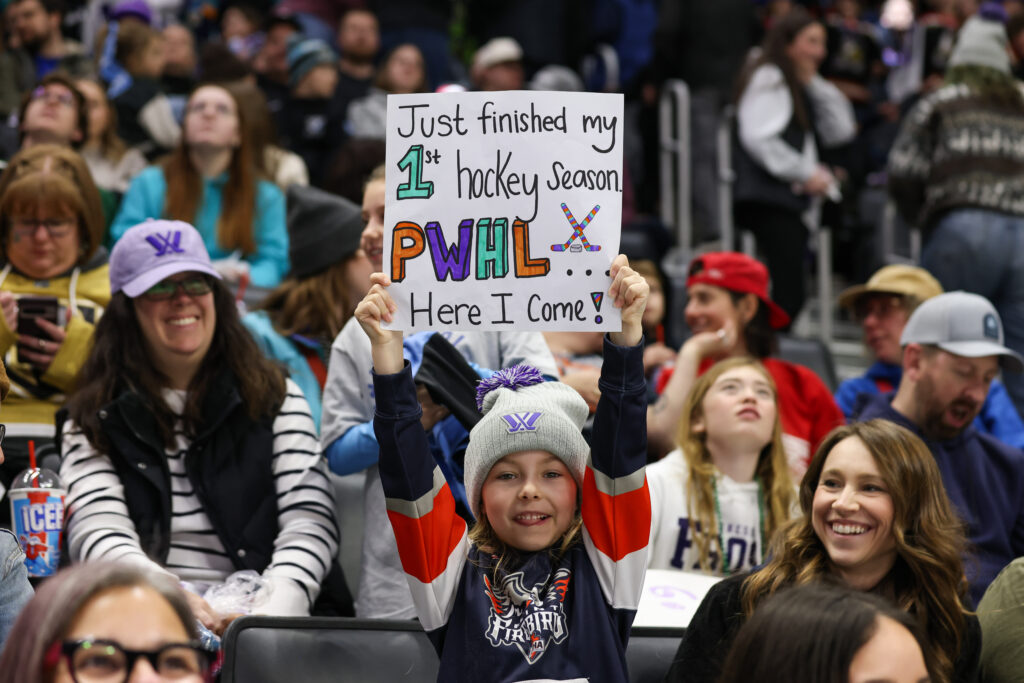
League eyes next steps for expansion team
While the PWHL still has over 20 proposals from markets requesting a team — and rumors swirling that Seattle could join Vancouver as a 2025/26 season expansion contingent — the league is currently making more concrete plans for its official seventh squad.
"With this team comes more opportunities for the best women's hockey players in the world to continue competing in one league," remarked Hefford. "The talent pool has never been deeper, and with a strong 2025 draft class ahead, we're pleased that even more women are going to be able to play at the professional level."
Details for an upcoming expansion draft to begin stocking Vancouver's roster will be announced shortly, and the team will also take part in the 2025 PWHL Draft on June 24th.
"The PWHL is setting a new standard for women's hockey. The game has never been faster, more physical, or more skilled," Hefford added. "We're so excited for this city to experience the parity and the competitiveness that our league has every single game."
The USA skated to victory on Sunday, taking down archrival Canada in a 4-3 overtime thriller to earn the team's 11th IIHF Women’s World Championship title.
The US is now closing in on Canada's record 13 World Championship wins, setting the tone in the run-up to next year’s Winter Olympics as North America’s PWHL showcased its growing influence on the international stage.
After Canada equalized the second-period goals from US defender Caroline Harvey and forward Abbey Murphy — the potential No. 1 pick in June's 2025 PWHL Draft — the game's third period saw Team USA lose starting goaltender Aerin Frankel to injury.
Backup goalie and IIHF World Championship debutant Gwyneth Philips stepped in, seeing the USA to a back-and-forth 3-3 tie at the end of regulation.
Philips's 17 saves — including 10 in overtime — allowed US forward and current Penn State junior Tessa Janecke to play hero, with the 20-year-old capitalizing on a turnover by tapping in a golden goal with three minutes left in the first overtime period.
"Just shows how strong we are as a group and how much we can persevere through anything," Janecke said afterwards. "I wouldn’t want to do it with any other group."
The tournament itself also proved to be a success, setting a new IIHF Women’s World Championship attendance record as 122,331 total fans took in the games in Czechia.
"I think this is a watershed moment for women's hockey, and it's really exciting to be a part of," said US captain Hilary Knight after earning her 10th Worlds gold medal.
In a shifting hockey landscape, the USA-Canada rivalry is only becoming more intense — and the looming 2026 Olympics will provide yet another chance to steal the sport's global spotlight.
After defeating Germany 3-0 in Thursday’s quarterfinal round, Team USA will take on host nation Czechia in Saturday's 2025 IIHF World Championship semifinals, as the squad seeks a record-extending 24th straight appearance in the tournament's title game on Sunday.
"They have the home crowd, so it's definitely going to be a gritty game," US forward Lacey Eden said of Saturday’s matchup. "It's going to be a battle, but we'll be ready for it. We can use the fan energy and kind of go off that."
This year's tournament mirrors Team USA's path in 2024, when the US downed fellow powerhouse Canada in the group stage to reach the title game undefeated — only to lose 6-5 to their North American rivals in an overtime thriller of a championship match.
"It's everything to us," USA defender Cayla Barnes said earlier this week. "We want to be in that final and obviously want to be back on top of the podium, seeing as we fell short last year."
Canada has their own semifinal ahead of them, as the 2024 champs take the ice against Finland in Saturday’s IIHF closer.
Finland is the only country other than the US and Canada to ever play in a Women’s World Championship final, earning silver after taking down Canada in the semis in 2019.
How to watch the 2025 IIHF World Championship this weekend
The 2025 IIHF World Championship semifinals begin Saturday, when the USA takes on Czechia at 9 AM ET, before Canada battles Finland at 1 PM ET.
Saturday's winners will square off in Sunday's final at 12 PM ET.
All US games will air live on the NHL Network.
The PWHL dropped its 2025 Draft details on Tuesday, with the league’s third-annual entry draft set to take over Ottawa, Canada — home of the Charge — on June 24th.
Eligible NCAA standouts and other pro hockey prospects have until May 8th to declare for selection, following the PWHL’s May 3rd regular-season finale.
Notably, the second-year league follows the Gold Plan when it comes to determining draft order. Under this system, teams eliminated from the playoffs have an incentive to continue hunting wins, as franchises who amass more points post-elimination secure higher draft picks.
The New York Sirens and 2024 champions Minnesota Frost currently sit below the postseason cutoff line, meaning both teams could snag the most draft capital when the league returns from international break later this month.
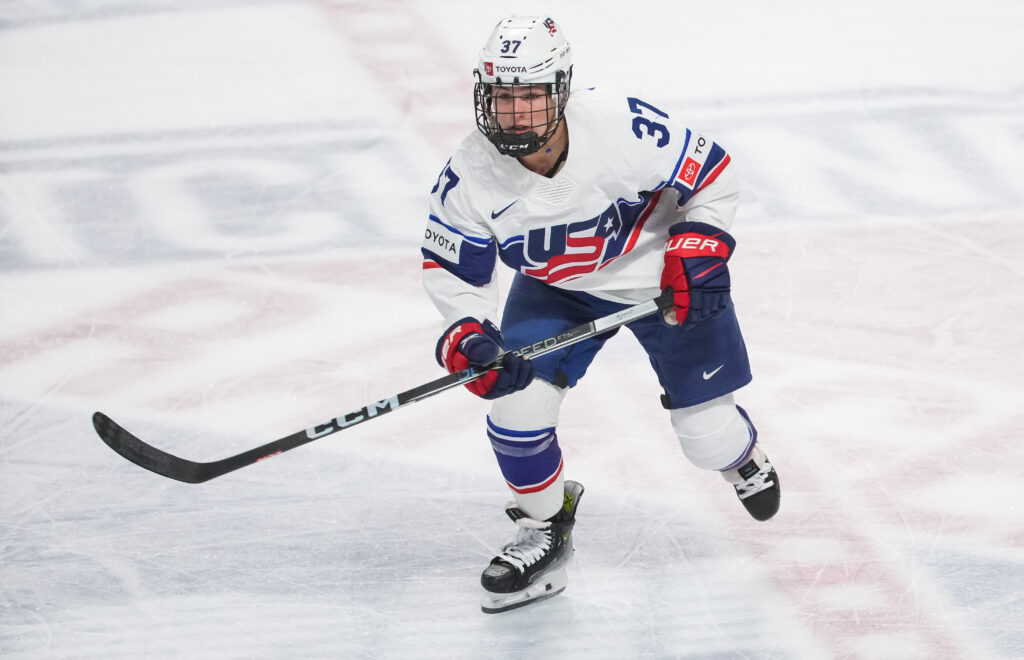
NCAA stars likely to top 2025 PWHL Draft selections
Last year, the New York Sirens selected Princeton star Sarah Fillier as the overall No. 1 pick, with the rookie forward having an immediate impact in her debut pro season.
Fillier currently ranks second in individual points scored on the 2024/25 PWHL stat sheet, trailing only US hockey legend and Boston Fleet captain Hilary Knight.
As for who will join Fillier and Minnesota Frost forward Taylor Heise — the inaugural 2023 PWHL Draft No. 1 pick — atop this year's draft, two NCAA standouts are likely contenders.
Should she declare, University of Minnesota forward Abbey Murphy is the projected 2025 No. 1 pick.
However, Murphy could return to the Golden Gophers for a final NCAA season following her international duty with the 2025 IIHF Women's World Championship semifinals-bound Team USA.
Should Murphy defer her pro debut, 2024/25 NCAA MVP Casey O'Brien is the likely top selectee, having already declared for the draft.
The Wisconsin captain wrapped up her NCAA campaign as this season's leading scorer, claiming 88 points on 26 goals and 62 assists en route to this year’s national championship — the third NCAA title of her college career.
The New York Sirens made PWHL history this weekend, as forward Abby Roque — who grew up in Michigan — scored the second-year league’s first-ever Michigan goal against the Ottawa Charge on Saturday.
With Ottawa leading 3-1 in the game's third period, Roque skated behind the Charge’s net, snapping the puck under the crossbar to register her sixth goal of the season.
A very rare trick shot, "The Michigan" entered the sport's lingo in the 1990s, after University of Michigan men's hockey winger Mike Legg successfully replicated minor-leaguer Bill Armstrong’s lacrosse-style "high wrap" goal during a 1996 NCAA Tournament game against Minnesota.
Requiring deft mechanics, the shooter lifts the puck with their stick, slotting it into the top near corner of the net behind an unsuspecting goalkeeper.
"There was a lot around the net and I just I knew I had time behind the net to pick it up, [so] I thought I may as well," said Roque after her performance. "It’s something that has become a joke and we say every day when I come to the rink: 'Michigan today.'"
"The opportunity presented itself, so I had to try."
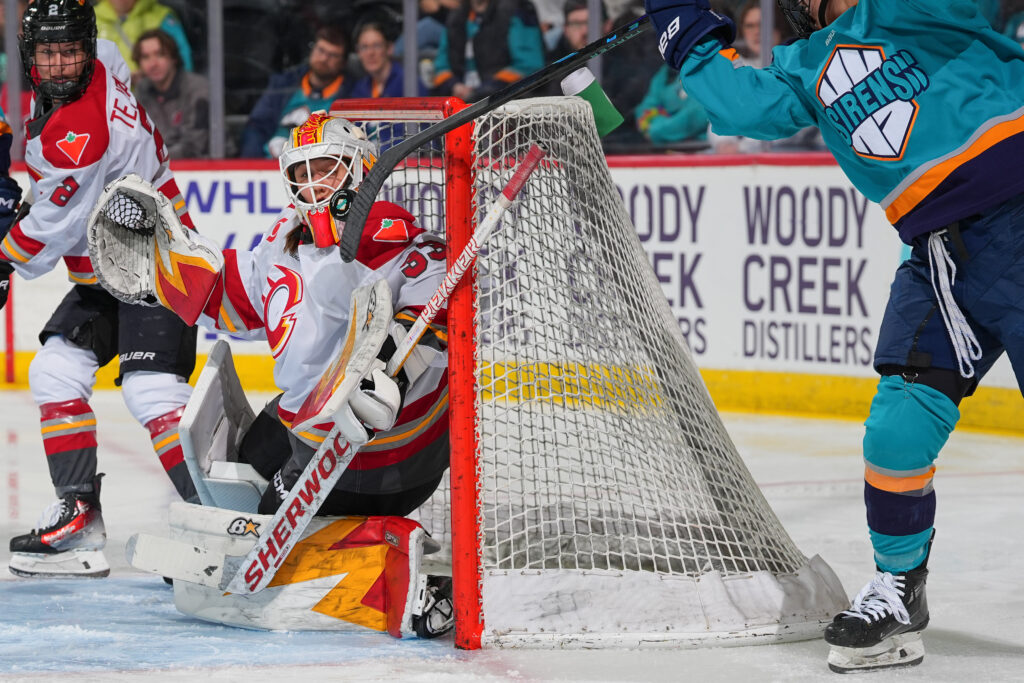
Roque joins short list of "Michigan" goalscorers
Roque — Team USA's first-ever Indigenous hockey player — now inks her name onto a short list of athletes who have scored a Michigan goal.
The first successful major pro league attempt came in the NHL, when Carolina Hurricanes winger Andrei Svechnikov converted the trick shot against the Calgary Flames in October 2019.
On the women's side, PWHL history-maker Roque is just the third athlete to claim Michigan goal success.
Slovakia's teen star Nela Lopušanová paved the way, flicking in the first-ever women's Michigan shot during the 2023 U18 IIHF World Championships at just 14 years old.
Leading the charge Stateside is Brown University forward Margot Norehad. As a freshman for the Bears, Norehad netted a Michigan during a February 2024 NCAA game against Quinnipiac.
While Roque's shot wasn't enough to secure a Sirens win on Saturday, she did manage to her individual 16-point season total with style.
On the heels of last season’s successful "Takeover Weekends" in Detroit and Pittsburgh, the PWHL announced Monday that the league will embark on a nine-city Takeover Tour spanning nine new markets across the US and Canada this winter.
Accordingly, the tour will shift nine 2024/25 regular-season games to neutral locations, with stars hitting the ice primarily in NHL arenas.
All six teams — the Boston Fleet, Minnesota Frost, Montréal Victoire, New York Sirens, Ottawa Charge, and Toronto Sceptres — will play a minimum of two tour matches. Ottawa and Montréal lead all teams with four off-site games on the docket.
According to PWHL SVP of business operations Amy Scheer, "When exploring potential locations for a PWHL game, the enthusiasm from cities eager to engage with our League was incredibly encouraging."
Ultimately, after kicking off in Seattle on January 5th, the second-year league's tour will visit Vancouver, Denver, Québec City, Buffalo, Raleigh, and Detroit before wrapping up in St. Louis on March 29th. One final city, set to host Toronto and Ottawa on February 16th, will be announced in the coming weeks.
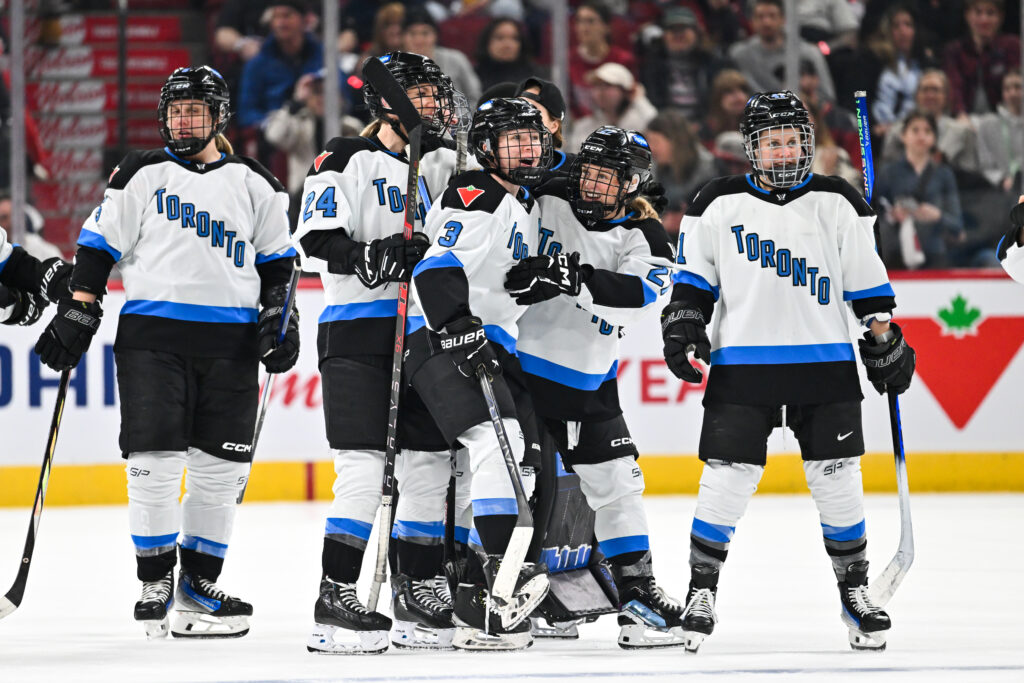
Audience growth and league expansion fuel PWHL tour
With two teams set to join the PWHL before the puck drops on the 2025/26 season, the Takeover Tour allows the league to test potential expansion markets while simultaneously growing fan interest across North America.
"Bringing PWHL games to fans across both countries is a natural next step as we continue building our audience," noted Scheer in the league's statement.
"The PWHL Takeover Tour lets us showcase our game and exceptional athletes across a wider North American footprint — an exciting moment for our players and an important move for our business as we consider expansion."
WE’RE TAKING OVER! 🗣️
— PWHL (@thepwhlofficial) November 18, 2024
PWHL Takeover Tour will feature games across North America, with stops as far west as Seattle and as far east as Québec City.
📰 https://t.co/Iu8AdqUf0T pic.twitter.com/usQJpZi0Lp
How to attend the PWHL's 2025 Takeover Tour
Tickets for January 19th's bout between the Ottawa Charge and Montréal Victoire in Québec City are available online now. Pre-sales for all other Tour stops begin on Thursday.
Additionally, all 2024/25 tickets will be available on Friday at 10 AM in each game's local market.